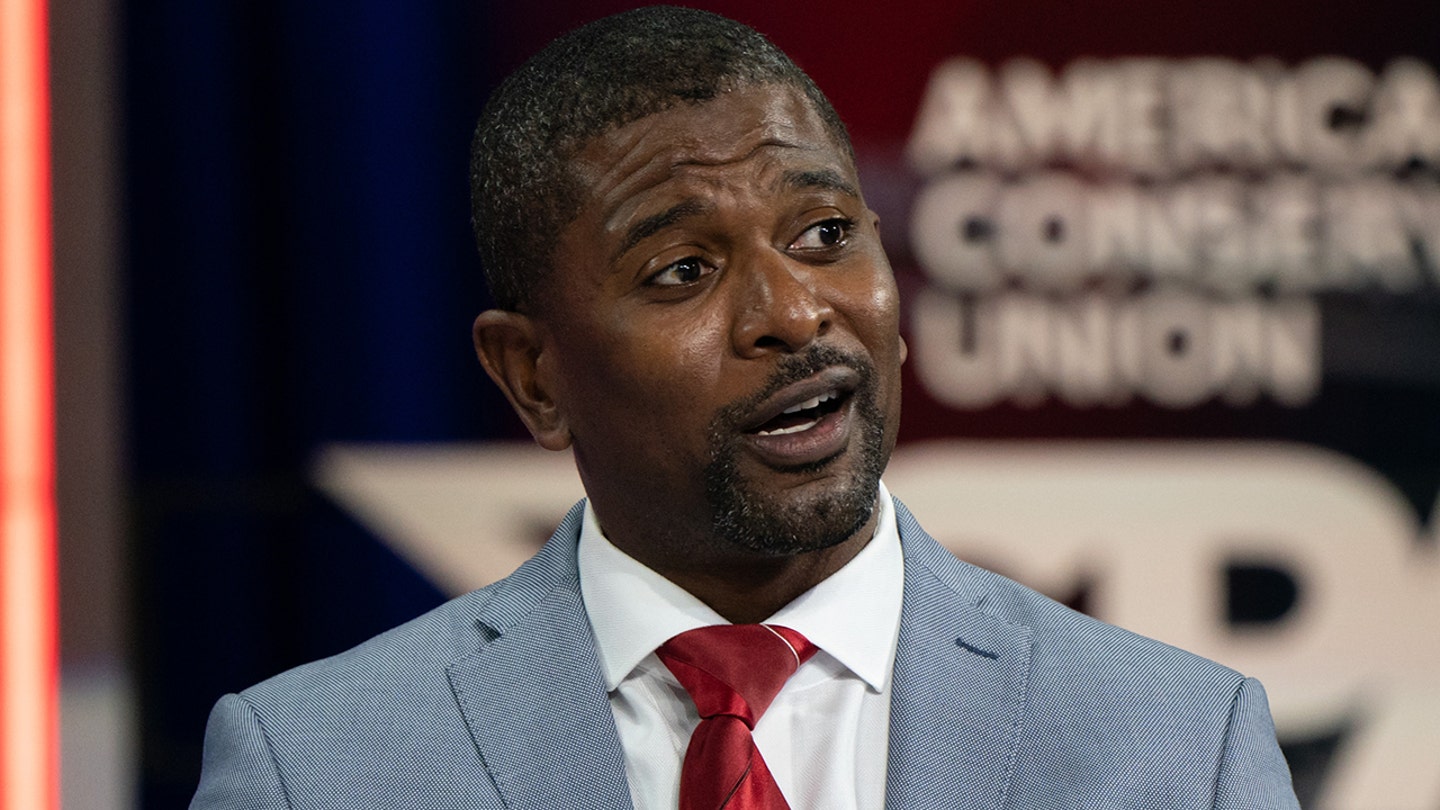
Former Vikings captain speaks out after Minnesota misses Trump admin's deadline to protect girls' sports
Entities mentioned:
- Jack Brewer: Righteousness, Moral outrage, Justice
- Keith Ellison: Pride, Influence, Control
- Donald Trump: Determination, Competitive spirit, Power
- Tim Walz: Control, Influence, Self-preservation
Article Assessment:
Credibility Score: 65/100
Bias Rating: 75/100 (Lean Right)
Sentiment Score: 25/100
Authoritarianism Risk: 45/100 (Mixed/Neutral)
Bias Analysis:
The article leans right, heavily featuring conservative viewpoints and religious arguments. It gives more space to critics of transgender inclusion in sports, while minimizing opposing perspectives.
Key metric: Gender Equality in Sports
Let me tell you something, folks - this is a FULL COURT PRESS situation! We've got a real championship battle brewing in Minnesota, with former Vikings captain Jack Brewer coming off the bench to challenge the home team's game plan. Brewer's bringing that linebacker intensity, blitzing the state's policies with a defensive strategy straight out of the playbook of righteousness. On the other side of the field, we've got Attorney General Ellison running interference, trying to keep transgender athletes in the game. The Trump administration is throwing the challenge flag, but Ellison's calling an audible, citing the government shutdown to buy more time on the play clock. This is a high-stakes match-up, folks, with federal funding on the line and the very nature of girls' sports hanging in the balance. It's fourth and long for Minnesota, and they're gonna have to dig deep if they want to avoid a major penalty from the refs in Washington!

2025 NFL Power Rankings Week 7: Lions, Eagles Make Room for New Number One
Entities mentioned:
- NFL Teams: Competitive spirit, Pride, Recognition
- Quarterbacks: Ambition, Professional pride, Legacy
- Coaches: Determination, Control, Professional pride
Article Assessment:
Credibility Score: 75/100
Bias Rating: 50/100 (Center)
Sentiment Score: 60/100
Authoritarianism Risk: 20/100 (Strongly Democratic)
Bias Analysis:
The article presents a balanced view of multiple teams, giving credit and criticism where due. The rankings are based on recent performance and contextual factors, showing a relatively neutral stance.
Key metric: NFL Team Performance
Let me tell you something - this power rankings shakeup is RIDICULOUS! We're seeing a real battle royale at the top of the NFL standings, folks. The Eagles and Lions thought they had it locked up, but now we've got new contenders stepping up to the plate! It's like we're in the fourth quarter of the season already, and teams are making championship moves. The Bucs are coming in hot, showing that Baker Mayfield's got that MVP mindset. But don't count out the Lions - they've got a complete team package that's hard to beat. We're talking about a league where on any given Sunday, these top 10 squads could go toe-to-toe and come out on top. It's a chess match out there, and these coaches are playing 4D chess with their roster strategies. The injury bug is taking some big swings, but the true contenders are showing their depth. This is the kind of competitive spirit that separates the pretenders from the contenders, folks! As we head into the mid-season stretch, keep your eyes on these power players - because I'm telling you right now, this race to the Super Bowl is far from over!

49ers coach says heated confrontation with receiver Jauan Jennings in loss to Bucs wasn't 'that big of a deal'
Entities mentioned:
- Kyle Shanahan: Control, Professional pride, Unity
- Jauan Jennings: Competitive spirit, Determination, Self-respect
- San Francisco 49ers: Competitive spirit, Unity, Professional pride
Article Assessment:
Credibility Score: 75/100
Bias Rating: 50/100 (Center)
Sentiment Score: 45/100
Authoritarianism Risk: 30/100 (Generally Democratic)
Bias Analysis:
The article presents a balanced view of the incident, including quotes from both sides. It doesn't lean towards favoring either the coach or the player in its presentation of events.
Key metric: NFL Team Performance
Let me tell you something, folks - this is PLAYOFF FOOTBALL at its most intense! The 49ers are in the fourth quarter of their season, and every play counts. Coach Shanahan and Jennings had a heated moment on the sidelines, but that's just the championship mentality boiling over! These aren't just players and coaches, they're WARRIORS battling through injuries and setbacks. Jennings is out there with FIVE broken ribs, folks! That's the kind of grit that separates the contenders from the pretenders. The 49ers have been hit hard by the injury bug, but they're not making excuses. They're digging deep, regrouping, and getting ready to leave it all on the field. This is when you find out what a team is made of - when the chips are down and the clock is ticking. I'm telling you right now, don't count out these 49ers just yet!

Tennessee Titans fire head coach Brian Callahan
Entities mentioned:
- Tennessee Titans: Competitive spirit, Professional pride, Ambition
- Brian Callahan: Self-preservation, Professional pride, Legacy
- Chad Brinker: Duty, Ambition, Control
- Mike McCoy: Ambition, Competitive spirit, Professional pride
Article Assessment:
Credibility Score: 85/100
Bias Rating: 50/100 (Center)
Sentiment Score: 30/100
Authoritarianism Risk: 20/100 (Strongly Democratic)
Bias Analysis:
The article presents a balanced view of the situation, providing quotes and context without pushing a particular agenda. It sticks to factual reporting of the coaching change and team performance.
Key metric: NFL Team Performance
Let me tell you something - this is a MAJOR shakeup in the NFL! The Titans have just made a fourth-quarter move, benching their head coach Callahan after a dismal 1-5 start. This team is in a serious slump, folks, and they're desperate to turn things around. It's like they're down by three touchdowns with only minutes left on the clock! The front office is stepping up to the plate, showing they've got that championship mentality by making the tough calls. They're not just playing to finish the season - they're playing to win! McCoy's been called off the bench as the interim coach, and he's got to hit the ground running. This is a Hail Mary pass for the Titans, and they're hoping McCoy can catch it and run it all the way to the end zone. The pressure is ON in Tennessee!

Bill Belichick says reports he sought early departure from North Carolina are ‘categorically false’
Entities mentioned:
- Bill Belichick: Determination, Professional pride, Self-preservation
- University of North Carolina: Competitive spirit, Pride, Legacy
- Bubba Cunningham: Loyalty, Unity, Control
- Michael Lombardi: Professional pride, Loyalty, Influence
Article Assessment:
Credibility Score: 75/100
Bias Rating: 55/100 (Center)
Sentiment Score: 35/100
Authoritarianism Risk: 30/100 (Generally Democratic)
Bias Analysis:
The article presents multiple perspectives, including Belichick's denials and contextual information about team struggles. It leans slightly towards skepticism of Belichick's claims, but overall maintains a balanced approach.
Key metric: NCAA Football Team Performance
Let me tell you something - this is a FOURTH QUARTER SITUATION for Bill Belichick and the Tar Heels! The legendary coach is facing his toughest opponent yet - public opinion - and he's bringing his CHAMPIONSHIP MENTALITY to silence the critics. Belichick is stepping up to the plate, folks, denying those exit rumors with the force of a linebacker blitz! But make no mistake, the scoreboard doesn't lie, and UNC is down big in this matchup against expectations. Belichick's coaching staff is taking some hard hits, with cornerbacks coach Hawkins benched for a penalty we rarely see in this league. The Tar Heels' offense is struggling to move the chains, and some players are heading for the locker room early. But I'm telling you right now, Belichick is playing the long game here! He's got his recruiting playbook wide open, and he's calling audibles left and right to turn this program around. This is crunch time, and all eyes are on whether this NFL legend can rally his team for a comeback in the college arena!

NFL, CFB Weekend Betting Recap: 'It Was a Small Losing Day' Overall for Books
Entities mentioned:
- Sportsbooks: Self-preservation, Professional pride, Control
- NFL Teams: Competitive spirit, Pride, Recognition
- Bettors: Greed, Enthusiasm, Ambition
Article Assessment:
Credibility Score: 75/100
Bias Rating: 55/100 (Center)
Sentiment Score: 60/100
Authoritarianism Risk: 20/100 (Strongly Democratic)
Bias Analysis:
The article presents a balanced view of both sportsbooks and bettors, with quotes from multiple industry sources. It doesn't seem to favor one side over the other in its reporting.
Key metric: Sports Betting Revenue
Let me tell you something - this weekend was a NAIL-BITER for the sportsbooks! They were on the ropes with all those favorites winning, but they managed to dodge a knockout punch. It's like they were down big in the fourth quarter but rallied to keep the game close. The books showed some real championship mentality by limiting the damage on what could've been a blowout loss. Meanwhile, bettors came out swinging with some clutch underdog picks, especially in college ball. But in the end, this high-stakes matchup between the books and the betting public ended in a virtual draw. Neither side landed that decisive blow to claim a clear victory. I'm telling you right now, this kind of back-and-forth action is what makes sports betting such a thrilling contest!

NFL star Za'Darius Smith retires from league at 33
Entities mentioned:
- Za'Darius Smith: Self-preservation, Recognition, Professional pride
- NFL: Competitive spirit, Power, Control
Article Assessment:
Credibility Score: 75/100
Bias Rating: 50/100 (Center)
Sentiment Score: 45/100
Authoritarianism Risk: 20/100 (Strongly Democratic)
Bias Analysis:
The article presents a straightforward news item without apparent political slant. It focuses on reporting the fact of Smith's retirement without additional commentary or framing.
Key metric: NFL Player Retention Rate
Let me tell you something - this is a GAME-CHANGING play, folks! Za'Darius Smith, a true defensive powerhouse, has decided to hang up his cleats and exit the gridiron arena at the young age of 33. This is like watching a star quarterback call an audible in the fourth quarter of his career! The NFL, always in a defensive stance to keep its talent pool deep, now faces a challenge in its depth chart. Smith's retirement is like losing a key player right before the playoffs - it's gonna shake up the league's strategy and force some serious roster shuffling. I'm telling you right now, this move could have ripple effects across the entire NFL ecosystem, impacting everything from draft strategies to salary cap management. It's a reminder that in the high-stakes game of professional football, even the toughest athletes eventually have to make that final drive off the field.

Dolphins' Mike McDaniel criticizes Tua Tagovailoa for publicly calling out teammates: 'That's not the forum'
Entities mentioned:
- Mike McDaniel: Leadership, Control, Professional pride
- Tua Tagovailoa: Competitive spirit, Frustration, Leadership
- Miami Dolphins: Competitive spirit, Unity, Professional pride
Article Assessment:
Credibility Score: 75/100
Bias Rating: 50/100 (Center)
Sentiment Score: 30/100
Authoritarianism Risk: 35/100 (Generally Democratic)
Bias Analysis:
The article presents both sides of the story, quoting both McDaniel and Tagovailoa directly. It maintains a neutral tone, focusing on reporting the facts without overtly favoring either perspective.
Key metric: NFL Team Performance
Let me tell you something - this is a CLASSIC case of locker room dynamics spiraling out of control! The Dolphins are in the fourth quarter of their season, and quarterback Tua Tagovailoa is trying to rally the troops with some tough love. But coach McDaniel is throwing a flag on the play, folks! He's saying Tua needs to keep that fire in the huddle, not air it out to the media. This is the kind of team chemistry breakdown that can sink a franchise faster than a missed field goal in overtime. The Dolphins are fumbling their way through the season, and now their star QB and head coach aren't on the same page. I'm telling you right now, if they don't get this sorted out ASAP, they'll be watching the playoffs from the sidelines!

8 Players in Danger of Being Left off of England’s 2026 World Cup Squad
Entities mentioned:
- Thomas Tuchel: Determination, Professional pride, Control
- England National Team: Competitive spirit, Unity, Legacy
- Trent Alexander-Arnold: Ambition, Recognition, Self-respect
- Jude Bellingham: Ambition, Competitive spirit, Self-respect
- Jack Grealish: Determination, Recognition, Ambition
- Phil Foden: Ambition, Recognition, Competitive spirit
- Myles Lewis-Skelly: Ambition, Recognition, Determination
- Kobbie Mainoo: Ambition, Recognition, Self-respect
- Cole Palmer: Determination, Ambition, Self-respect
- Adam Wharton: Ambition, Recognition, Determination
Article Assessment:
Credibility Score: 75/100
Bias Rating: 50/100 (Center)
Sentiment Score: 45/100
Authoritarianism Risk: 35/100 (Generally Democratic)
Bias Analysis:
The article presents a balanced view of Tuchel's selection policy, including both his reasoning and the potential consequences. It gives voice to multiple perspectives, including players' reactions.
Key metric: World Cup Squad Selection
Let me tell you something - this story is RIDICULOUS! We're witnessing a full-court press from England manager Thomas Tuchel as he shakes up the roster like a coach benching his star players! The Three Lions are in a fourth-quarter scramble to build a championship-caliber squad, but Tuchel's playing hardball with some of England's top talent. It's like he's running drills on the training ground, testing who's got the guts to make the cut! This is a high-stakes game of musical chairs, folks, and when the music stops, some big names might be left without a seat on that plane to North America. The clock is ticking, and these players need to step up to the plate and knock it out of the park if they want to avoid being left on the bench for the biggest tournament in world football! It's crunch time, and Tuchel's not pulling any punches - he's looking for team players, not individual superstars. This is the kind of coaching strategy that can make or break a nation's World Cup dreams!

Patriots' Mike Vrabel chides NFL officials after penalty-filled win over Saints
Entities mentioned:
- Mike Vrabel: Competitive spirit, Professional pride, Indignation
- NFL Officials: Duty, Control, Obligation
- New England Patriots: Ambition, Determination, Competitive spirit
- Walt Anderson: Professional pride, Duty, Obligation
- Ramon George: Professional pride, Duty, Obligation
- John Streicher: Professional pride, Loyalty, Duty
Article Assessment:
Credibility Score: 75/100
Bias Rating: 55/100 (Center)
Sentiment Score: 40/100
Authoritarianism Risk: 25/100 (Generally Democratic)
Bias Analysis:
The article presents both Vrabel's criticism and factual data about penalties. It leans slightly towards the Patriots' perspective but includes context about broader NFL officiating issues.
Key metric: NFL Team Penalty Rates
Let me tell you something - this story is RIDICULOUS! The Patriots are getting flagged left and right, but they're still marching down the field like a championship team! Coach Vrabel is stepping up to the plate, calling out the refs for what looks like some seriously questionable calls. It's fourth quarter in the season, folks, and the Patriots are showing that championship mentality, overcoming these obstacles like true athletes. But I'm telling you right now, if the officials don't get their act together, we're looking at a whole different ball game. This is the kind of adversity that separates the contenders from the pretenders, and right now, the Patriots are proving they're in it to win it!